2010年职称英语考试卫生类模拟试题
2010年职称英语考试卫生类B级模拟试题 _6
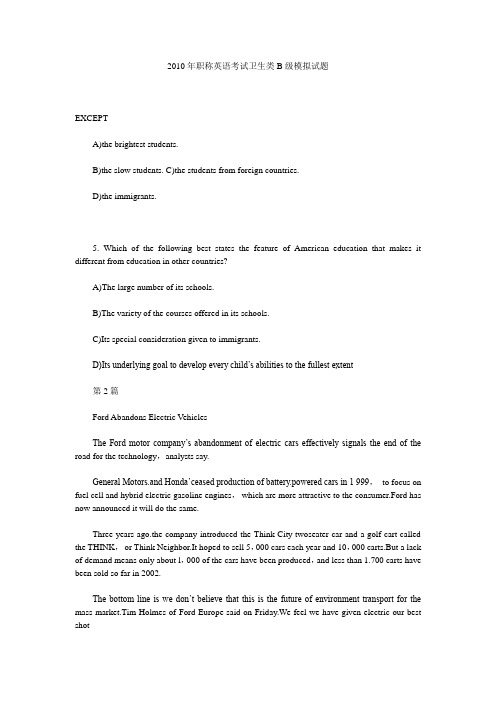
2010年职称英语考试卫生类B级模拟试题EXCEPTA)the brightest students.B)the slow students. C)the students from foreign countries.D)the immigrants.5. Which of the following best states the feature of American education that makes it different from education in other countries?A)The large number of its schools.B)The variety of the courses offered in its schools.C)Its special consideration given to immigrants.D)Its underlying goal to develop every child’s abilities to the fullest extent第2篇Ford Abandons Electric VehiclesThe Ford motor company’s abandonment of electric cars effectively signals the end of the road for the technology,analysts say.General Motors.and Honda’ceased production of battery.powered cars in 1 999,to focus on fuel cell and hybrid electric gasoline engines,which are more attractive to the consumer.Ford has now announced it will do the same.Three years ago.the company introduced the Think City twoseater car and a golf cart called the THINK,or Think Neighbor.It hoped to sell 5,000 cars each year and 10,000 carts.But a lack of demand means only about l,000 of the cars have been produced,and less than 1.700 carts have been sold so far in 2002.The bottom line is we don’t believe that this is the future of environment transport for the mass market.Tim Holmes of Ford Europe said on Friday.We feel we have given electric our best shotThe Think City has a range of only about 53 miles and up to a six-hour battery recharge time.General Motors’EVI electric vehicle also had a limited range.of about 100 miles.The very expensive batteries also mean electric cars cost much more than petrol-powered alternatives.An electric Toyot~RA V4 EV vehicle costs over$42,000 in the US,compared with just $17,000 for the petrol version.Toyota and Nissanare now the only major automanufacturers to produce electric vehicles.。
2010年职称英语考试卫生类(A)级试题
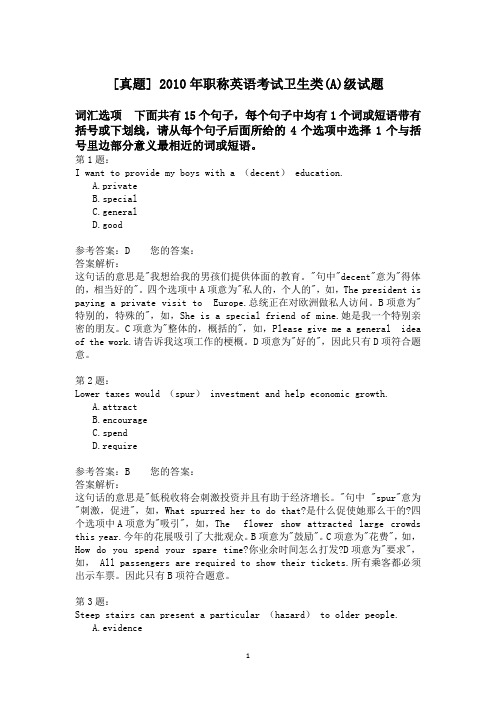
[真题] 2010年职称英语考试卫生类(A)级试题词汇选项下面共有15个句子,每个句子中均有1个词或短语带有括号或下划线,请从每个句子后面所给的4个选项中选择1个与括号里边部分意义最相近的词或短语。
第1题:I want to provide my boys with a (decent) education.A.privateB.specialC.generalD.good参考答案:D 您的答案:答案解析:这句话的意思是"我想给我的男孩们提供体面的教育。
"句中"decent"意为"得体的,相当好的"。
四个选项中A项意为"私人的,个人的",如,The president is paying a private visit to Europe.总统正在对欧洲做私人访问。
B项意为"特别的,特殊的",如,She is a special friend of mine.她是我一个特别亲密的朋友。
C项意为"整体的,概括的",如,Please give me a general idea of the work.请告诉我这项工作的梗概。
D项意为"好的",因此只有D项符合题意。
第2题:Lower taxes would (spur) investment and help economic growth.A.attractB.encourageC.spendD.require参考答案:B 您的答案:答案解析:这句话的意思是"低税收将会刺激投资并且有助于经济增长。
"句中 "spur"意为"刺激,促进",如,What spurred her to do that?是什么促使她那么干的?四个选项中A项意为"吸引",如,The flower show attracted large crowds this year.今年的花展吸引了大批观众。
2010年职称英语考试卫生类B级模拟试题 _9
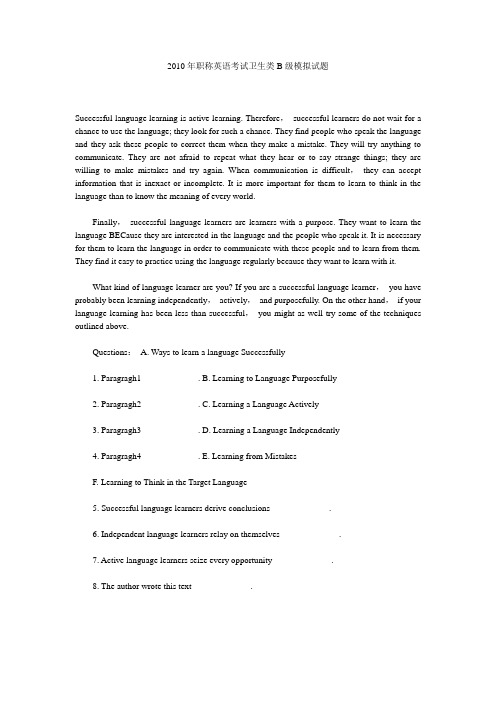
2010年职称英语考试卫生类B级模拟试题Successful language learning is active learning. Therefore,successful learners do not wait for a chance to use the language; they look for such a chance. They find people who speak the language and they ask these people to correct them when they make a mistake. They will try anything to communicate. They are not afraid to repeat what they hear or to say strange things; they are willing to make mistakes and try again. When communication is difficult,they can accept information that is inexact or incomplete. It is more important for them to learn to think in the language than to know the meaning of every world.Finally,successful language learners are learners with a purpose. They want to learn the language BECause they are interested in the language and the people who speak it. It is necessary for them to learn the language in order to communicate with these people and to learn from them. They find it easy to practice using the language regularly because they want to learn with it.What kind of language learner are you? If you are a successful language learner,you have probably been learning independently,actively,and purposefully. On the other hand,if your language learning has been less than successful,you might as well try some of the techniques outlined above.Questions:A. Ways to learn a language Successfully1. Paragragh1_____________. B. Learning to Language Purposefully2. Paragragh2_____________. C. Learning a Language Actively3. Paragragh3_____________. D. Learning a Language Independently4. Paragragh4_____________. E. Learning from MistakesF. Learning to Think in the Target Language5. Successful language learners derive conclusions _____________.6. Independent language learners relay on themselves _____________.7. Active language learners seize every opportunity _____________.8. The author wrote this text _____________.。
2010年职称英语(卫生类)C级真题试卷(题后含答案及解析)
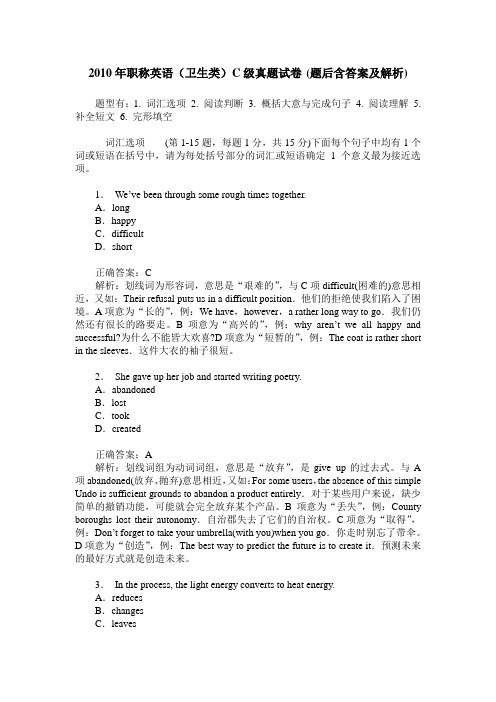
2010年职称英语(卫生类)C级真题试卷(题后含答案及解析)题型有:1. 词汇选项 2. 阅读判断 3. 概括大意与完成句子 4. 阅读理解 5. 补全短文6. 完形填空词汇选项(第1-15题,每题1分,共15分)下面每个句子中均有1个词或短语在括号中,请为每处括号部分的词汇或短语确定1个意义最为接近选项。
1.We’ve been through some rough times together.A.longB.happyC.difficultD.short正确答案:C解析:划线词为形容词,意思是“艰难的”,与C项difficult(困难的)意思相近,又如:Their refusal puts us in a difficult position.他们的拒绝使我们陷入了困境。
A项意为“长的”,例:We have,however,a rather long way to go.我们仍然还有很长的路要走。
B项意为“高兴的”,例:why aren’t we all happy and successful?为什么不能皆大欢喜?D项意为“短暂的”,例:The coat is rather short in the sleeves.这件大衣的袖子很短。
2.She gave up her job and started writing poetry.A.abandonedB.lostC.tookD.created正确答案:A解析:划线词组为动词词组,意思是“放弃”,是give up的过去式。
与A 项abandoned(放弃、抛弃)意思相近,又如:For some users,the absence of this simple Undo is sufficient grounds to abandon a product entirely.对于某些用户来说,缺少简单的撤销功能,可能就会完全放弃某个产品。
B项意为“丢失”,例:County boroughs lost their autonomy.自治郡失去了它们的自治权。
2010年职称英语考试卫生类B级模拟试题 _3
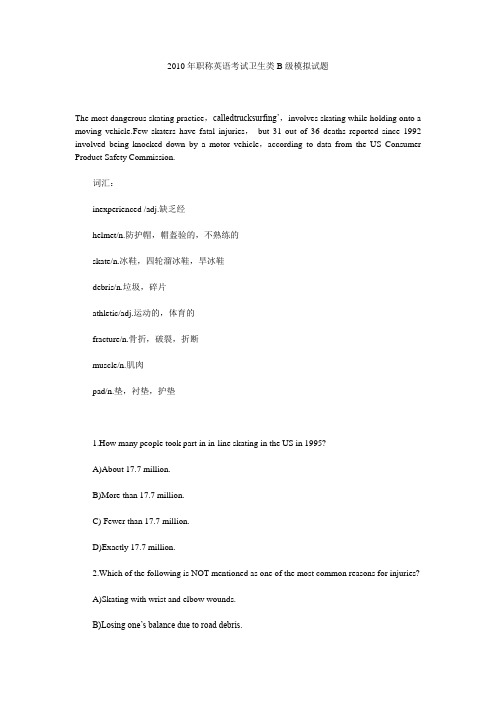
2010年职称英语考试卫生类B级模拟试题The most dangerous skating practice,calledtrucksurfing’,involves skating while holding onto a moving vehicle.Few skaters have fatal injuries,but 31 out of 36 deaths reported since 1992 involved being knocked down by a motor vehicle,according to data from the US Consumer Product Safety Commission.词汇:inexperienced /adj.缺乏经helmet/n.防护帽,帽盔验的,不熟练的skate/n.冰鞋,四轮溜冰鞋,旱冰鞋debris/n.垃圾,碎片athletic/adj.运动的,体育的fracture/n.骨折,破裂,折断muscle/n.肌肉pad/n.垫,衬垫,护垫1.How many people took part in in-line skating in the US in 1995?A)About 17.7 million.B)More than 17.7 million.C) Fewer than 17.7 million.D)Exactly 17.7 million.2.Which of the following is NOT mentioned as one of the most common reasons for injuries?A)Skating with wrist and elbow wounds.B)Losing one’s balance due to road debris.C)Being unable to stop due to high speed.D)Falling down when doing a trick.3.What are the things experts might NOT advise youngsters to wear?A)Wrist guards.B)Elbow and knee pads.C)Helmets of some kind.D)Boots and thick clothes.4.Truck-surfingmeansA)skating inside a truck while it is moving.B)skating while holding onto a moving truck.C)skating at a speed faster than a truck.D)skating at the end of a moving truck.5.According to the last paragraph,bumping with a motor vehicle took up deaths reported since 1 992.A)over 80%B)below 80%C)about 31%D)about 36%阅读下面的短文,文章中有5处空白,文章后有6组文字,请根据文章的内容选择5组文字,将其分别放会文章原有位置,以恢复文章原貌。
2010年职称英语考试卫生类B级模拟试题
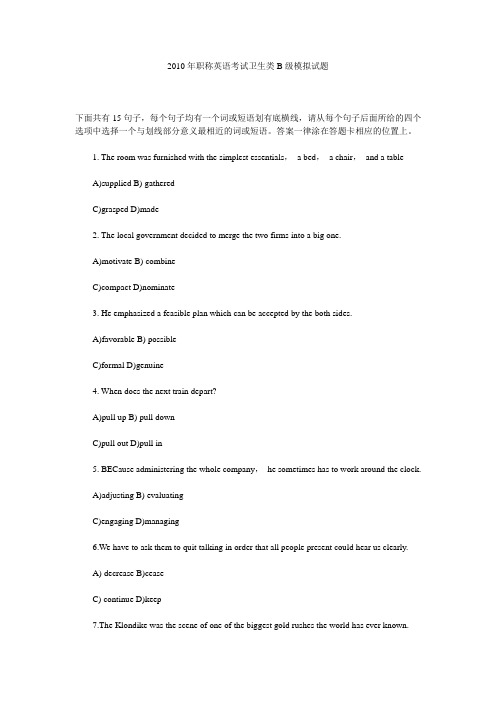
2010年职称英语考试卫生类B级模拟试题下面共有15句子,每个句子均有一个词或短语划有底横线,请从每个句子后面所给的四个选项中选择一个与划线部分意义最相近的词或短语。
答案一律涂在答题卡相应的位置上。
1. The room was furnished with the simplest essentials, a bed, a chair,and a tableA)supplied B) gatheredC)grasped D)made2. The local government decided to merge the two firms into a big one.A)motivate B) combineC)compact D)nominate3. He emphasized a feasible plan which can be accepted by the both sides.A)favorable B) possibleC)formal D)genuine4. When does the next train depart?A)pull up B) pull downC)pull out D)pull in5. BECause administering the whole company,he sometimes has to work around the clock.A)adjusting B) evaluatingC)engaging D)managing6.We have to ask them to quit talking in order that all people present could hear us clearly.A) decrease B)ceaseC) continue D)keep7.The Klondike was the scene of one of the biggest gold rushes the world has ever known.A) location B)viewC) event D)landscape8. She has been the subject of massive media coverage.A) extensive B) negativeC) expensive D)active9.The conference explored the possibility of closer trade links.A) rejected B) investigatedC)proposed D)postponed10. The sea was calm and still.A) quite B)quietC) yet D)rough11. In a bullfight,it is the movement,not the color,of objects that arouses the bull.A) confuses B)excitesC) scares D)satisfies12. The committee comprises five persons.A) absorbs B)concernsA) excludes D)involves13. All the people assembled at Mary’s house.A) collected B)fixedC) asserted D)assist14. We derive knowledge mainly from booksA)deprive B) obtainC) descend D)trace15.We all consider him a man of dynamic personalities.A)dangerous B) doubtfulC)active D)easy阅读下面这篇短文,短文后列出了七个句子,请根据短文的内容对每个句子作出判断。
2010年职称英语考试卫生类B级模拟试题 _4
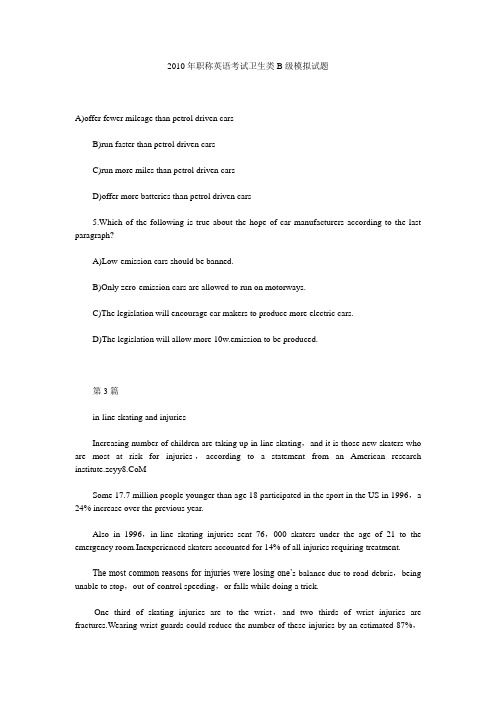
2010年职称英语考试卫生类B级模拟试题A)offer fewer mileage than petrol driven carsB)run faster than petrol driven carsC)run more miles than petrol driven carsD)offer more batteries than petrol driven cars5.Which of the following is true about the hope of car manufacturers according to the last paragraph?A)Low-emission cars should be banned.B)Only zero-emission cars are allowed to run on motorways.C)The legislation will encourage car makers to produce more electric cars.D)The legislation will allow more 10w.emission to be produced.第3篇in-line skating and injuriesIncreasing number of children are taking up in-line skating,and it is those new skaters who are most at risk for injuries,according to a statement from an American research Some 17.7 million people younger than age 18 participated in the sport in the US in 1996,a 24% increase over the previous year.Also in 1996,in-line skating injuries sent 76,000 skaters under the age of 21 to the emergency room.Inexperienced skaters accounted for 14% of all injuries requiring treatment.The most common reasons for injuries were losing one’s balance due to road debris,being unable to stop,out-of-control speeding,or falls while doing a trick.One third of skating injuries are to the wrist,and two thirds of wrist injuries are fractures.Wearing wrist guards could reduce the number of these injuries by an estimated 87%,according to the AAP.Likewise,elbow pads could reduce elbow injuries by 82%,and knee pads could reduce the number of knee injuries by 32%,advise the experts.Helmet used by young skaters is required by law in New York and Oregon,and the research institute also recommends that young skaters wear a bicycle helmet or a similar approved sports helmet.The age at which children are ready to use in.1ine skates depends upon a number of conditions,including the child’S foot size and body strength,general athletic ability and muscle coordination,and the ability to judge traffic and pay attention to the condition of the skating surface ahead,the expels advise.。
2010年职称英语等级考试真题+答案-卫生A

2010年职称英语等级考试真题+答案-卫生ADbeen contaminated by sewage.A.pollutedB.darkenedC.mixedD.blackened4.Don't be so innocent as to believe everything the advertisements say.A.ignorantB.illiterateC.simpleD.stupid5.He comprehends the theory of relativity.A.learnsB.teachesC.understandsD.investigates6.He donated 1,000 RMB to those flood victims last year.A.allocatedB.distributedC.sacrificedD.presented7.I was so excited to see snow that I was indifferent to the cold.A.carelessB.unconcernedC.irritatedD.annoying8.We have met with some unexpected difficulties.A.changedB.overcomeC.solvedD.encountered9.John has always remained loyal to his family and friends.A.friendlyB.faithfulC.hostileD.objective10.He maintained that the opinion was wrong.A.emphasizedB.repairedC.insistedD.helped11.The dagger has penetrated his stomach through his coat.A.damagedB.went byC.woundedD.entered12.In the darkness,the hunter perceived that something was moving in the bushes.A.discoveredB.realizedC.sawD.sensed13.Is the clock in the tower accurate?A.correctB.newC.oldD.wrong14.He is accustomed to working hard.A.anxiousB.likelyedD.willing15.The mail was delayed for a week because of the flood.A.held downB.held inC.held offD.held on第2部分:阅读判断(第16~22题,每题1分,共7分)下面的短文后,列出了7个句子,请根据短文的内容对每个句子作出判断:如果该句提供的是正确信息,请选择A;如果该句提供的是错误信息,请选择B;如果该句的信息文中没有提及,请选择C.DrugsDoctors,sixty years ago,could do little to help victims of polio. Serious cases usually ended in death. In 1955, a vaccine was developed that prevented the disease. Today,polio is no longer a major health problem.Many of the most important drugs thatdoctors prescribe today have been developed in the last 30 years. Modern drugs are complex,specific and powerful. People need to know more about drugs in order to use them safely.Early people discovered by accident that some of the plants growing around them seemed useful to heal sores,relieve pain or even cure diseases. These plants were the first drugs. Now plants are still the source of some drugs. Quinine,for example,is a bitter-tasting drug used to treat the chills and fever of malaria and to reduce attacks of the disease. It is made from the bark of the cinchona tree,which grows in the Andes Mountains. The Indians of that region were the first to use the bark as a medicine. The Spanish people probably brought it to Europe in the early 1600s. Chemists learned how to get the pure drug from the bark. And in 1944,it was made artificially in the laboratory.Other important drugs,such as hormones and vaccines,are obtained from animals. But most of the modern drugs come from chemicalcombinations worked out by research scientists. Most people never see drugs in their simple form as chemicals. Instead,they are seen as tablets,capsules or liquids that contain the drug and other ingredients.People use drugs to get different results. Some drugs attack the organism that causes a disease. They cure by killing the organism. Other drugs relieve what we call the symptoms of the disease:the headache,pain,fever,or chills,and make the patient more comfortable. These constitute most over-the-counter drugs. People can get them in drug stores.16.The main idea of this passage is the development of drugs.A.RightB.WrongC.Not mentioned17.Today polio disappears in that polio is no longer a health problem.A.RightB.WrongC.Not mentioned18.It seems to the author that the medicine used by early people was probably effective.A.RightB.WrongC.Not mentioned19.The Spanish first learned how to used quinine as a medicine.A.RightB.WrongC.Not mentioned20.Hormones are obtained from animals.A.RightB.WrongC.Not mentioned21.People can use drugs in two aspects,such as curing cancer and relieving headache.A.RightB.WrongC.Not mentioned22.The “over-the-counter drugs” are thosethat patients can get without doctors' prescriptions.A.RightB.WrongC.Not mentioned第3部分:概括大意与完成句子(第23~30题,每题1分,共8分)下面的短文后有两项测试任务:(1)第23-26题要求从所给的6个选项中为第2-5段每段选择1个最佳标题;(2)第27-30题要求从所给的6个选项中为每个句子确定1个最佳选项。
2010年职称英语考试卫生类B级模拟试题 _7
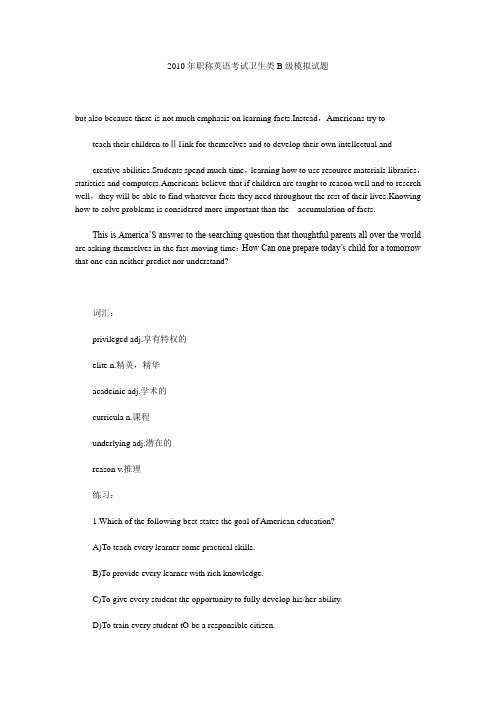
2010年职称英语考试卫生类B级模拟试题but also because there is not much emphasis on learning facts.Instead,Americans try toteach their children toⅡ1ink for themselves and to develop their own intellectual andcreative abilities.Students spend much time,learning how to use resource materials libraries,statistics and computers.Americans believe that if children are taught to reason well and to reserch well,they will be able to find whatever facts they need throughout the rest of their lives.Knowing how to solve problems is considered more important than the accumulation of facts.This is America’S answer to the searching question that thoughtful parents all over the world are asking themselves in the fast-moving time:How Can one prepare today’s child for a tomorrow that one can neither predict nor understand?词汇:privileged adj.享有特权的elite n.精英,精华acadeinic adj.学术的curricula n.课程underlying adj.潜在的reason v.推理练习:1.Which of the following best states the goal of American education?A)To teach every learner some practical skills.B)To provide every learner with rich knowledge.C)To give every student the opportunity to fully develop his/her ability.D)To train every student tO be a responsible citizen.2.It is implied in the passage thatA)all high-school students take the same courses.B)every high?school student must take some practical ability training courses.C)every public school offers the same academic subjects.D)the subjects every student takes may vary.3.American schools place GREat emphasis on the learner’SA)enrichment of knowledge.B)accumulation of facts.C)acquisition of the ability to be creative.D)acquisition of the ability to work with his hands.4.According to the passage,American education meets the needs of all the following。
2010年职称英语之卫生类C级试题
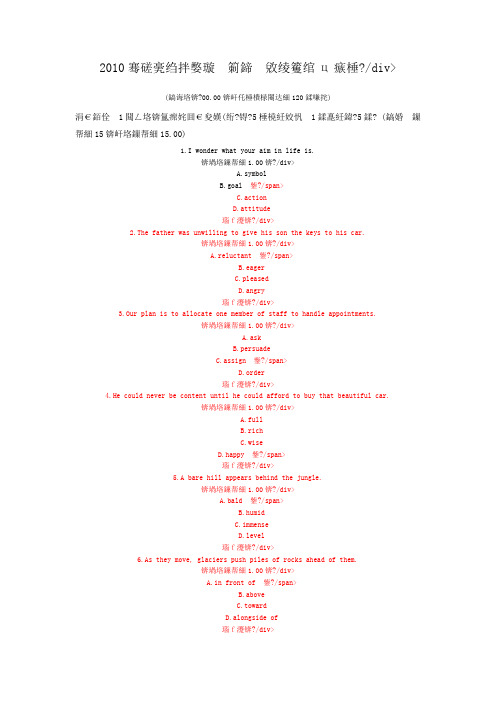
2010骞磋亴绉拌嫳璇箣鍗敓绫籆绾ц瘯棰?/div>(鎬诲垎锛?00.00锛屽仛棰樻椂闂达細120鍒嗛挓)涓€銆佺1閮ㄥ垎锛氳瘝姹囬€夋嫨(绗?锝?5棰橈紝姣忛1鍒嗭紝鍏?5鍒? (鎬婚鏁帮細15锛屽垎鏁帮細15.00)1.I wonder what your aim in life is.锛堝垎鏁帮細1.00锛?/div>A.symbolB.goal 鈭?/span>C.actionD.attitude瑙f瀽锛?/div>2.The father was unwilling to give his son the keys to his car.锛堝垎鏁帮細1.00锛?/div>A.reluctant 鈭?/span>B.eagerC.pleasedD.angry瑙f瀽锛?/div>3.Our plan is to allocate one member of staff to handle appointments.锛堝垎鏁帮細1.00锛?/div>A.askB.persuadeC.assign 鈭?/span>D.order瑙f瀽锛?/div>4.He could never be content until he could afford to buy that beautiful car.锛堝垎鏁帮細1.00锛?/div>A.fullB.richC.wiseD.happy 鈭?/span>瑙f瀽锛?/div>5.A bare hill appears behind the jungle.锛堝垎鏁帮細1.00锛?/div>A.bald 鈭?/span>B.humidC.immenseD.level瑙f瀽锛?/div>6.As they move, glaciers push piles of rocks ahead of them.锛堝垎鏁帮細1.00锛?/div>A.in front of 鈭?/span>B.aboveC.towardD.alongside of瑙f瀽锛?/div>7.When he arrived home, he deposited his coat on the door.锛堝垎鏁帮細1.00锛?/div>A.keptB.locatedC.storedD.placed 鈭?/span>瑙f瀽锛?/div>8.I bed you once again, never desert me in my misfortunes.锛堝垎鏁帮細1.00锛?/div>A.condemnB.forsake 鈭?/span>C.offendD.pluck瑙f瀽锛?/div>9.The government would not dare to impose taxes on such necessities as bread or milk.锛堝垎鏁帮細1.00锛?/div>A.cutB.forceC.occurD.charge 鈭?/span>瑙f瀽锛?/div>10.Mary鈥檚 daughter showed ingenuity in making a dress for her doll.锛堝垎鏁帮細1.00锛?/div>A.cleverness 鈭?/span>B.sincerityC.thoughtfulnessD.truthfulness瑙f瀽锛?/div>11.The merit of sales tax is that it decreases government reliance on income taxes.锛堝垎鏁帮細1.00锛?/div>A.balanceB.outcomeC.virtue 鈭?/span>D.supply瑙f瀽锛?/div>12.No one knows the exact origin of this custom.锛堝垎鏁帮細1.00锛?/div>A.natureB.reasonC.beginning 鈭?/span>D.result瑙f瀽锛?/div>13.A university is an educational institution which awards degrees and performs research.锛堝垎鏁帮細1.00锛?/div>A.carries out 鈭?/span>B.carries awayC.carries offD.carries through瑙f瀽锛?/div>rge-scale security forces were readied for action during the Pope鈥檚 visit toWroclaw.锛堝垎鏁帮細1.00锛?/div>A.deployed 鈭?/span>B.concentratedC.employedD.involved瑙f瀽锛?/div>15.They all think that the price of personal computers will soon plunge.锛堝垎鏁帮細1.00锛?/div>A.fall 鈭?/span>B.leapC.dipD.sink瑙f瀽锛?/div>浜屻€佺2閮ㄥ垎锛氶槄璇诲垽鏂?绗?6锝?2棰橈紝姣忛1鍒嗭紝鍏?鍒? (鎬婚鏁帮細1锛屽垎鏁帮細7.00)銆€Vocational Education 銆€銆€Vocational education refers to education for a particular occupation, industrialized countries have seen a fall in demand for unskilled workers, and an increase in jobs in the professional, technical, commercial and administrative sector. Vocational education is traditionally associated with trades and crafts: young people were apprentice to employers for a number of years and learned on the job. Today the focus has shifted from the workplace to secondary and higher education institutions and from employers 鈥?to government provision and finance. Trainees in most occupations combine workplace training with study at a technical or academic institution. In the former Soviet Union, school and work were always strongly linked from primary school. Germany provides nine out of ten young people not entering higher education with vocational training, and training is planned from national down to locate level through joint committees of government representatives, employers and trade unions. In some countries, skills are being grouped and 鈥渏ob families鈥?created so that individuals can move between jobs with similar technical requirements. In others 鈥渃ompetency-based education鈥?is advocated to equip individuals with 鈥渢ransferable鈥?as well as specific skills. In developing countries, where it is traditional for children to work form an early age, only a tiny proportion of students follow a formal vocational program, while the long specialist training of professionals such as doctors, lawyers and engineers is a costly burden. Training places for technicians, nurses, teachers and the essential workers are often limited. Worldwide, there is a slow but steady increase in the numbers of women training for occupations of influence in science, technology, law and business. It is also becoming clear that one course of vocational education is not enough for a lifetime. Retraining through continuing education isessential. 锛堝垎鏁帮細7.00锛?/div>(1).Vocational education refers to education for a usual vocation. 锛堝垎鏁帮細1.00锛?/div>A.RightB.Wrong 鈭?/span>C.Not mentioned瑙f瀽锛?/div>(2).So far as vocational training is concerned, industrialized countries need more workersfor jobs in the professional sector. 锛堝垎鏁帮細1.00锛?/div>A.Right 鈭?/span>B.WrongC.Not mentioned瑙f瀽锛?/div>(3).It is stated in the passage that the two major changes in vocational education are inthe place and the source of finance it is provided. 锛堝垎鏁帮細1.00锛?/div>A.Right 鈭?/span>B.WrongC.Not mentioned瑙f瀽锛?/div>(4).In the former Soviet Union, school and work were always weakly linked from primaryschool. 锛堝垎鏁帮細1.00锛?/div>A.RightB.Wrong 鈭?/span>C.Not mentioned瑙f瀽锛?/div>(5).In Germany, vocational education is the one that everybody can take voluntarily. 锛堝垎鏁帮細1.00锛?/div>A.RightB.WrongC.Not mentioned 鈭?/span>瑙f瀽锛?/div>(6).In some countries, in order to help people to become capable of taking different jobs,different skills within a broad category are taught. 锛堝垎鏁帮細1.00锛?/div>A.Right 鈭?/span>B.WrongC.Not mentioned瑙f瀽锛?/div>(7).It can be concluded from the passage that more vocational education has to be providedin the future. 锛堝垎鏁帮細1.00锛?/div>A.Right 鈭?/span>B.WrongC.Not mentioned瑙f瀽锛?/div>涓夈€佺3閮ㄥ垎锛氭鎷ぇ鎰忎笌瀹屾垚鍙ュ瓙(绗?3锝?0棰橈紝姣忛1鍒嗭紝鍏?鍒? (鎬婚鏁帮細8锛屽垎鏁帮細8.00)16.Hypnosis 銆€銆€1 Increasing numbers of American doctors are using a technique known as hypnosis. They say hypnosis often can help persons suffering pain and stress. It also can help speed the healing of burns and treats some forms of asthma and some skin diseases.Hypnosis is not new. It has been used for many years both in scientific research and to please crowds at public gatherings. 銆€銆€2 Hypnosis is commonly described as a condition similar to sleep. But, experts say it is more a form of deep thought. The thought becomes so intense that it is no longer just a thought. To the person, it becomes reality. 銆€銆€3 Hypnotized patients are reported to have increased self-control and a reduced sense of pain. Some doctors use hypnosis to limit pain during a medical operation. Hypnosis is used mainly when the patient may have problems with usual anesthetic or pain-killing drugs. 銆€銆€4 Experts say there is little chance that a patient will awaken during such an operation. But, if this happens, the operation is temporarily halted, and the patient hypnotized again. Doctors may advise hypnosis for women who are giving birth. Dentist may use it in place of traditional painkilling drugs, such as movocaine. 銆€銆€5 Hypnosis also has been used to treat burn victims. Researchers have found that burn victims who are hypnotized improvefaster that those who are not. But, they are not sure why this happens. 銆€銆€6 Hypnosis can reduce or end a patient鈥檚 pain. But experts say this does not mean the patient is cured. The problem that caused the pain still must be treated. 銆€銆€7 Experts also say persons cannot be forced to do something they would normally oppose. That is why hypnosis often is not effective in treating cigarette smokers and persons who eat or drink too much.The success of the technique depends on how much someone wants it to succeed.Paragraph 2______ 锛堝垎鏁帮細1.00锛?/div>A.hypnosis can reduce or end a patient鈥檚 pain.B.Why hypnosis is not effective in treating cigarette smokers and some other illness.C.Hypnosis can treat burn victims.D.The definition of hypnosis 鈭?/span>E.The function of hypnosisF.The importance of hypnosis oppose瑙f瀽锛?/div>17.Paragraph 5______锛堝垎鏁帮細1.00锛?/div>A.hypnosis can reduce or end a patient鈥檚 pain.B.Why hypnosis is not effective in treating cigarette smokers and some other illness.C.Hypnosis can treat burn victims. 鈭?/span>D.The definition of hypnosisE.The function of hypnosisF.The importance of hypnosis oppose瑙f瀽锛?/div>18.Paragraph 6_____锛堝垎鏁帮細1.00锛?/div>A..hypnosis can reduce or end a patient鈥檚 pain. 鈭?/span>B.Why hypnosis is not effective in treating cigarette smokers and some other illness.C.Hypnosis can treat burn victims.D.The definition of hypnosisE.The function of hypnosisF.The importance of hypnosis oppose瑙f瀽锛?/div>19.Paragraph 7_____锛堝垎鏁帮細1.00锛?/div>A.hypnosis can reduce or end a patient鈥檚 pain.B.Why hypnosis is not effective in treating cigarette smokers and some otherillness. 鈭?/span>C.Hypnosis can treat burn victims.D.The definition of hypnosisE.The function of hypnosisF.The importance of hypnosis oppose瑙f瀽锛?/div>20.Hypnosis is commonly described as_____锛堝垎鏁帮細1.00锛?/div>A..how much someone wants it to succeedB.A form of deep thoughtC.A condition similar to sleep 鈭?/span>D.Have increased self-control and a reduced sense of painE.Hypnosis can鈥檛 reduce or end a patient鈥檚 painF.Persons can鈥檛 be forced to do something they would normally oppose瑙f瀽锛?/div>21.Hypnotized patients are reported to_____锛堝垎鏁帮細1.00锛?/div>A.how much someone wants it to succeedB.A form of deep thoughtC.A condition similar to sleepD.Have increased self-control and a reduced sense of pain 鈭?/span>E.Hypnosis can鈥檛 reduce or end a patient鈥檚 painF.Persons can鈥檛 be forced to do something they would normally oppose瑙f瀽锛?/div>22.Hypnosis is not effective in treating cigarette smokers and persons who eat or drink toomuch is because______锛堝垎鏁帮細1.00锛?/div>A.how much someone wants it to succeedB.A form of deep thoughtC.A condition similar to sleepD.Have increased self-control and a reduced sense of painE.Hypnosis can鈥檛 reduce or end a patient鈥檚 painF.Persons can鈥檛 be forced to do something they would normally oppose 鈭?/span>瑙f瀽锛?/div>23.The success of the technique depends on_____锛堝垎鏁帮細1.00锛?/div>A.how much someone wants it to succeed 鈭?/span>B.A form of deep thoughtC.A condition similar to sleepD.Have increased self-control and a reduced sense of painE.Hypnosis can鈥檛 reduce or end a patient鈥檚 painF.Persons can鈥檛 be forced to do something they would normally oppose瑙f瀽锛?/div>鍥涖€佺4閮ㄥ垎锛氶槄璇荤悊瑙?绗?1锝?5棰橈紝姣忛3鍒嗭紝鍏?5鍒? (鎬婚鏁帮細3锛屽垎鏁帮細45.00)銆€銆€绗竴绡?銆€銆€U.S. Eats Too Much Salt 銆€銆€People in the United States consume more than twice the recommended amount of salt, raising their risk for high blood pressure, heart attacks and strokes, government health experts said on Thursday. 銆€銆€They found nearly 70 percent of U. S. adults are in high-risk groups that would benefit from a lower-salt of no more than 1,500 mg per day, yet most consume closer to 3,500 nig per day. 銆€銆€"It's important to eat people to eat less salt. People who adopt a heart-healthy eating pattern that includes a diet low in sodium and rich in potassium and calcium can improve their blood pressure," Dr. Darwin labarthe of the Centers for Disease Control and Prevention said in a statement. 銆€銆€"People need to know their recommended daily sodium limit and take action to reduce sodium intake," Labarthe said.The study in CDC's report on death and disease used national survey data to show that two out of three adults should be consuming no more than 1,500 mg of sodium per day because they are black or over the age of 40-- which are considered high-risk groups. Yet studies show most people in the United States eat 3,436 mg of sodium per day, according to a 2005-2006 CDC estimate. 銆€銆€Most of the sodium eaten comes from package, processed and restaurant foods. The CDC said it will join other agencies in the Health and Human Services department in working with major food manufacturers and chain restaurants to reduce sodium levels in the food supply. 銆€銆€Nationwide, 16 million men and women have heart disease and 5.8 million are estimated to have had a stroke. Cutting salt consumption can reduce these risks, the CDC said. 锛堝垎鏁帮細15.00锛?/div>(1).Too much salt raises one's risk for 锛堝垎鏁帮細3.00锛?/div>A.high blood pressure.B.heart attacks.C.strokes.D.all of the above. 鈭?/span>瑙f瀽锛?/div>(2).How much salt do most American adults eat per day? 锛堝垎鏁帮細3.00锛?/div>A.No more than 1,500 mgB.Closer to 3,500 mg. 鈭?/span>C.Less than 3,436 mg.D.Closer to 1,500 mg.瑙f瀽锛?/div>(3).To improve their blood pressure, people should have a diet 锛堝垎鏁帮細3.00锛?/div>A.rich in potassium and sodium.B.rich in potassium and calcium. 鈭?/span>C.rich in calcium and sodium.D.none of the above.瑙f瀽锛?/div>(4).The high-risk groups include those 锛堝垎鏁帮細3.00锛?/div>A.who are black.B.who are over the age of 40.C.who are white and young.D.both A and B 鈭?/span>瑙f瀽锛?/div>(5).Packaged, processed and restaurant foods are known to be 锛堝垎鏁帮細3.00锛?/div>A.cheap.B.tasty.C.rich in salt. 鈭?/span>D.healthy.瑙f瀽锛?/div>銆€绗簩绡?銆€銆€One of the Greatest Artists ----Picasso 銆€銆€Pablo Ruiz Picasso was the favorite child of his family. He was the only boy among a great many girl cousins. That was enough to make him important, but his father loved him especially, because he knew his son was going to be an artist. Pablo knew the word for pencil even before he could say Mamma and Papa. When he was small he spent hours by himself making pleasing little drawings of animals and people. If his mother sent him out to play in the square, he went on drawing in the dust under the trees. One of his favorite models was his younger sister, Lola. 銆€銆€Don Jose Ruiz, Pablo鈥檚 father, was director of the museum at Malaga in southern Spain. He earned only a small salary, but there was not much work to do and he was able to practice his hobby, which was painting pigeons. Don Jose loved pigeons very much. He painted them dead or alive in ones and twos and in dozens. Sometimes he painted them on paper, cut them out and stuck them on to canvas, sometimes he stuck real feathers on to his pictures. He knew a great deal about the technique of painting and he taught it all to Pablo. 銆€銆€Life in Malaga was very pleasant. In the hot sunshine, father and son would walk down to the beach to look at the boats on the shore or walk about the open markets. They made a strange pair. Don Jose was tall and thin, with red hair and beard, sad grey eyes and a fineset of whiskers. He was so shy and correct that he was nicknamed 鈥渢he Englishman鈥? Pablo was quite the opposite. He had his mother鈥檚 small, strong build; he had straight black hair, and bright black eyes that noticed everything that was going on around him. 锛堝垎鏁帮細15.00锛?/div>(1).What is the main topic of the passage? 锛堝垎鏁帮細3.00锛?/div>A.Pablo鈥檚 father and his influence on Pablo.B.Something about Pablo鈥檚 early life. 鈭?/span>C.Pablo鈥檚 natural ability for art.D.The difference between Pablo and his father.瑙f瀽锛?/div>(2).Pablo was particularly loved by his father because 锛堝垎鏁帮細3.00锛?/div>A.he showed an early talent of a painter.B.his father liked artists and also wanted Pablo to become one. 鈭?/span>C.he knew the word for pencil when he was small.D.he was the only boy among many girls in the family.瑙f瀽锛?/div>(3).Which of the following statements about Pablo鈥檚 father can be concluded from thepassage? 锛堝垎鏁帮細3.00锛?/div>A.He loved his work in the museum although he earned only a small salary.B.He wanted his son to become a painter and to paint pigeons as well.C.He liked the painting technique and stuck real feathers on to his pictures.D.His interest in painting must have had great influence on his son. 鈭?/span>瑙f瀽锛?/div>(4).Pablo and Don Jose were 鈥渁 strange pair鈥?in the sense that 锛堝垎鏁帮細3.00锛?/div>A.the father liked to walk about the town but the did not.B.the father liked to look at the boats on the shore in the sun but the son did not.C.they looked very different from each other although they were father and son. 鈭?/span>D.their manners were so different that they formed a strange contrast.瑙f瀽锛?/div>(5).According to the passage, 鈥渢he Englishman鈥?most probably refers to 锛堝垎鏁帮細3.00锛?/div>A.a person who has a typical English looking.B.a person who is shy when he is nicknamedC.a person who is easy-going and does not mind being nicknamed.D.a person who is shy and careful about his manners. 鈭?/span>瑙f瀽锛?/div>绗笁绡?銆€銆€Let Them Watch It 銆€銆€One hot night last July, when our new baby wouldn 鈥檛 or couldn鈥檛 sleep, I tried everything I could think of: a warm bottle, songs, gentle rocking. Nothing would settle him. Guessing that I had a long night ahead of me, I brought a portable TV into his room, figuring that watching the late movie was as good a way as any to kill off the hours until dawn. To my surprise, as soon as the TV lit up, the baby quieted right down, his little eyes focused brightly on the tube. Not to waste an opportunity for sleep, I then tip-fifth birthday. My wife and I heard no more of the baby that night, and the next morning when I went into his room, I found him still watching TV himself. 銆€銆€I found in my baby鈥檚 behavior a metaphor for the new generation. My wife and I had given him some books to examine, but he merely spit upon them. When we read to him, he did not feel comfortable. And so it is in the schools. We find that our students don鈥檛 read, that they lock down upon reading and scold those of us who teach it. All they want to do is watch TV. After this experience with the baby, however, I have reached a conclusion: let themwatch it. If television is that much more attractive to children than books, why should we fight it? Let them watch it all they want! 锛堝垎鏁帮細15.00锛?/div>(1).he author brought a TV set into his son鈥檚 room to 锛堝垎鏁帮細3.00锛?/div>A.make his son stop cryingB.spend the night watching TV 鈭?/span>C.leave it to his son.D.make his son fall asleep as soon as possible.瑙f瀽锛?/div>(2).The baby鈥檚 reaction to the TV was 锛堝垎鏁帮細3.00锛?/div>A.unexpected 鈭?/span>B.excitingC.awfulD.calm瑙f瀽锛?/div>(3).From the passage we know that the author is 锛堝垎鏁帮細3.00锛?/div>A.a doctorB.an editorC.a writerD.a teacher 鈭?/span>瑙f瀽锛?/div>(4).According to the passage, which is true of the school children? 锛堝垎鏁帮細3.00锛?/div>A.They prefer reading to watching TV.B.They like watching TV only after school.C.They would rather watch TV than read books. 鈭?/span>D.They like their teachers who teach them reading.瑙f瀽锛?/div>(5).What do you think is the author鈥檚 attitude toward TV expressed in the last twosentences? 锛堝垎鏁帮細3.00锛?/div>A.AngryB.SeriousC.Ironical 鈭?/span>D.Joking瑙f瀽锛?/div>浜斻€佺5閮ㄥ垎锛氳ˉ鍏ㄧ煭鏂?绗?6锝?0棰橈紝姣忛2鍒嗭紝鍏?0鍒? (鎬婚鏁帮細1锛屽垎鏁帮細10.00)The Spread of Microorganisms 銆€銆€There is scarcely a place on earth which is naturally free of microorganisms 銆€銆€(46). But on external body surfaces, on lining membranes and inside tubes and organs that are connected with the outside---such as the mouth, throat, nose and large intestine ---- both harmless and pathogenic microbes live in large numbers.(47). If these natural defenses are sound, a person may conceal many microbes without illeffect. However, if his resistance becomes lowered, an infection can result. 銆€銆€Microbes are spread about through an almost infinite variety of means. (48). The more crowded the conditions, the greater the chances of epidemics breaking out. 銆€銆€(49). 銆€銆€Although microbes cannot fly, the dust of the air is alive with them. In close quarters the atmosphere is further polluted by bacteria-loaded tiny drops discharged by coughing and even normal conversation. Pathogenic microbes are also spread by rats, mice, flies and mosquitoes. (50). In slum areas there is often a combination of crowded conditions and poor sanitation. In addition, many of the inhabitants have lowered resistance because ofshortage of food and other undesirable unhealthy practices. As a result, epidemics are likely to begin in these districts. 銆€銆€All civilized societies establish and enforce measures designed to protect the health of their populations. Most of these practices are concerned with preventing the spread of the pathogenic organisms. 銆€銆€A. The atmosphere is a carrier of microorganisms. 銆€銆€B. One exception is the interior of normal body tissue. 銆€銆€C. Microbial growth is further helped by the widespread presence of dirt and the lack of sunlight. 銆€銆€D. The body has natural defenses against these organisms. 銆€銆€E. The body has no defenses against these organisms. 銆€銆€F. The simplest way is by person-to-person contact. 锛堝垎鏁帮細10.00锛?/div>A.B. 鈭?/span>C.D.E.F.瑙f瀽锛?/div>A.B.C.D. 鈭?/span>E.F.瑙f瀽锛?/div>A.B.C.D.E.F. 鈭?/span>瑙f瀽锛?/div>A. 鈭?/span>B.C.D.E.F.瑙f瀽锛?/div>A.B.C. 鈭?/span>D.E.F.瑙f瀽锛?/div>鍏€佺6閮ㄥ垎锛氬畬褰㈠~绌?绗?1锝?5棰橈紝姣忛1鍒嗭紝鍏?5鍒? (鎬婚鏁帮細1锛屽垎鏁帮細15.00)銆€8 New York Students Have Swine Flu 銆€銆€The Centers for Disease Control and Prevention has confirmed 51 of swine flu in eight students at a New York preparatory school, Mayor Michael Bloomberg said Sunday. The students have had only 52 symptoms and none havebeen hospitalized, he said. Some of the students have already recovered. 銆€銆€More than 100 students were absent from 53 due to flu-like symptoms last week. New York health officials tested samples for eight students Saturday and determined the students were probably 54 from swine flu, and the CDC confirmed the 55 on Sunday, Bloomberg said. 銆€銆€The announcement brings the 56 of confirmed swine flu cases in the United States to 20. Bloomberg and New York Health Commissioner Tom Frieden said there is no 57 of a citywide outbreak of the flu, and no sign of a potential 58 of swine flu at other schools. 銆€銆€Some students at the school 59 spring break1 in Mexico, Bloomberg said, but authorities have not determined 60 any of the students with a confirmed case of swine flu was in Mexico.Someone who traveled to Mexico may not have had any flu symptoms but 61 on the flu to someone else, he noted. 銆€銆€Frieden called 62 students who are home sick to stay hom e for 48 hours after their symptoms subside. 銆€銆€If symptoms are normal for a regular kind of flu, there is 63 need to go to a hospital, said Bloomberg. If symptoms become severe, as with any 64 , people should go to the hospital, he said. 銆€銆€St. Francis, which has 2,700 students, announced it will remain closed for two days. 65 whether the students' illnesses have been minor because they're young and healthy or because it is a minor strain of the virus, Frieden responded, "We don't know." 锛堝垎鏁帮細15.00锛?/div>A.cases 鈭?/span>B.basesC.doesD.noses瑙f瀽锛?/div>monB.physicald 鈭?/span>D.wild瑙f瀽锛?/div>A.workB.homeC.school 鈭?/span>D.hospital瑙f瀽锛?/div>A.escapingB.survivingC.dyingD.suffering 鈭?/span>瑙f瀽锛?/div>A.treatmentB.diagnosis 鈭?/span>C.doubtD.choice瑙f瀽锛?/div>A.pointB.number 鈭?/span>C.spreadD.value瑙f瀽锛?/div>A.chanceB.needC.hopeD.sign 鈭?/span>瑙f瀽锛?/div>A.welcomeB..outbreak 鈭?/span>C.successD.injury瑙f瀽锛?/div>A.spent 鈭?/span>B.madeC.tookD.traveled瑙f瀽锛?/div>A.whyB.howC.whenD.whether 鈭?/span>瑙f瀽锛?/div>A.passed 鈭?/span>B.keptC.rolleD.swept瑙f瀽锛?/div>A.atB.upC.on 鈭?/span>D.of瑙f瀽锛?/div>A.no 鈭?/span>B.muchC.anyD.a瑙f瀽锛?/div>A.personB.matterC.thingD.illness 鈭?/span>瑙f瀽锛?/div>A.Asked 鈭?/span>B.TesteC.TroubleD.Doubted瑙f瀽锛?/div>。
2010年职称英语考试卫生类B级模拟试题 _5
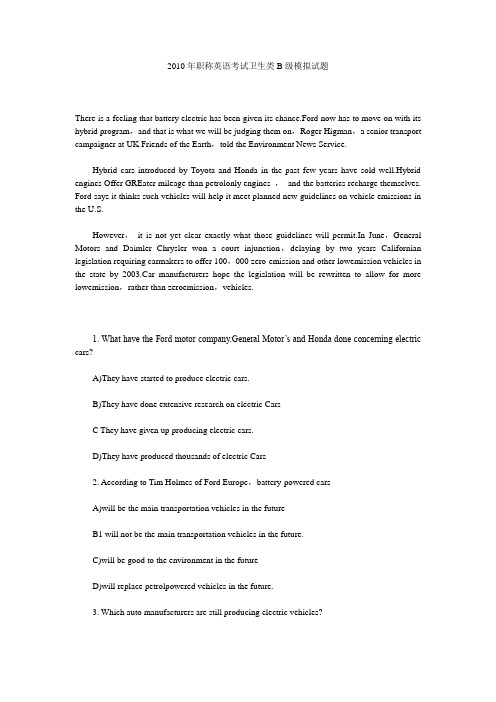
2010年职称英语考试卫生类B级模拟试题There is a feeling that battery electric has been given its chance.Ford now has to move on with its hybrid program,and that is what we will be judging them on,Roger Higman,a senior transport campaigner at UK Friends of the Earth,told the Environment News Service.Hybrid cars introduced by Toyota and Honda in the past few years have sold well.Hybrid engines Offer GREater mileage than petrolonly engines ,and the batteries recharge themselves. Ford says it thinks such vehicles will help it meet planned new guidelines on vehicle emissions in the U.S.However,it is not yet clear exactly what those guidelines will permit.In June,General Motors and Daimler Chrysler won a court injunction,delaying by two years Californian legislation requiring carmakers to offer 100,000 zero-emission and other lowemission vehicles in the state by 2003.Car manufacturers hope the legislation will be rewritten to allow for more lowemission,rather than zeroemission,vehicles.1. What have the Ford motor company.General Motor’s and Honda done concerning electric cars?A)They have started to produce electric cars.B)They have done extensive research on electric CarsC They have given up producing electric cars.D)They have produced thousands of electric Cars2. According to Tim Holmes of Ford Europe,battery-powered carsA)will be the main transportation vehicles in the futureB1 will not be the main transportation vehicles in the future.C)will be good to the environment in the futureD)will replace petrolpowered vehicles in the future.3. Which auto manufacturers are still producing electric vehicles?A)Toyota and NissanB)General Motor’s and HondaC)Ford and ToyotaD)Honda and Toyota4.According to the eighth paragraph,hybrid cars。
2010年全国职称英语卫生类(B级)全真模拟训练(3)-中大网校
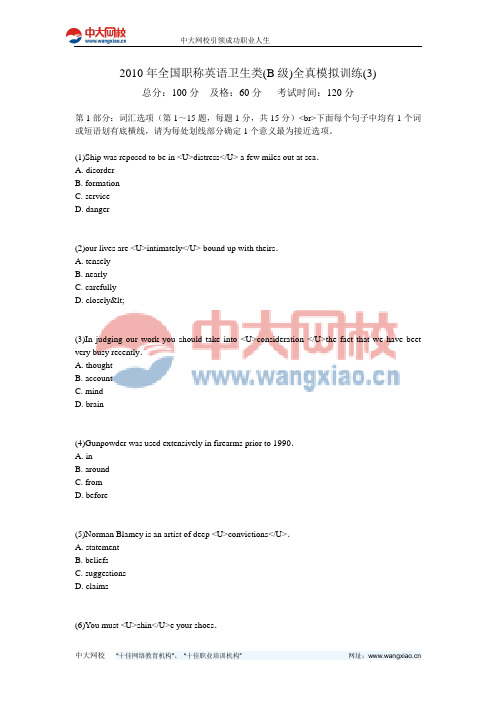
2010年全国职称英语卫生类(B级)全真模拟训练(3)总分:100分及格:60分考试时间:120分第1部分:词汇选项(第1~15题,每题1分,共15分)<br>下面每个句子中均有1个词或短语划有底横线,请为每处划线部分确定1个意义最为接近选项。
(1)Ship was reposed to be in <U>distress</U> a few miles out at sea.A. disorderB. formationC. serviceD. danger(2)our lives are <U>intimately</U> bound up with theirs.A. tenselyB. nearlyC. carefullyD. closely<(3)In judging our work you should take into <U>consideration </U>the fact that we have beet very busy recently.A. thoughtB. accountC. mindD. brain(4)Gunpowder was used extensively in firearms prior to 1990.A. inB. aroundC. fromD. before(5)Norman Blamey is an artist of deep <U>convictions</U>.A. statementB. beliefsC. suggestionsD. claims(6)You must <U>shin</U>e your shoes.B. clearC. washD. mend(7)The price of vegetables <U>varies</U> according to the weather.A. jumpB. risesC. fallsD. changes(8)She was <U>close</U> to Success.A. fastB. quickC. nearD. tight(9)A <U>notably</U> short man,he plays basketball with his staff several times a week.A. practicallyB. considerablyC. remarkablyD. fairly(10)The economy continued to <U>exhibit</U> signs of decline in SeptemberA. playB. sendC. showD. tell(11)It is <U>obvious</U> that he will win the game.A. likelyB. possibleC. clearD. probable(12)You should have <U>blended</U> the I buyer with the sugar thoroughly.A. spreadB. mixedD. covered(13)Can you <U>follow</U> the plot SO far?A. changeB. investigateC. writesD. understand(14)The story was very <U>touching</U>.A. inspiringB. boringC. movingD. absorbing(15)Mary has <U>derived</U> a good deal of benefit from her job.A. obtainedB. acceptedC. bribedD. produced第2部分:阅读判断(第16~22题,每题1分,共7分)<br>下面的短文后列出了7个句子,请根据短文的内容对每个句子做出判断:如果该句提供的是正确信息,请选择A;如果该句提供的是错误信息,请选择B;如果该句的信息文中没有提及,请选择C.(1)根据下列文章,请回答{TSE}题。
2010年职称英语考试卫生类B级模拟试题 _8
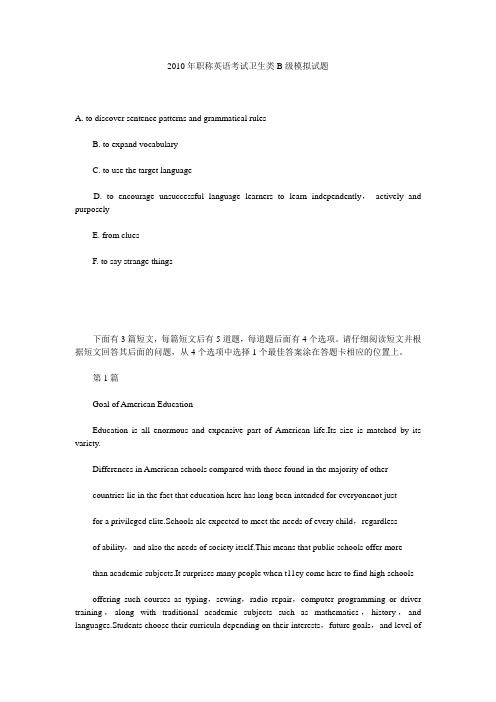
2010年职称英语考试卫生类B级模拟试题A. to discover sentence patterns and grammatical rulesB. to expand vocabularyC. to use the target languageD. to encourage unsuccessful language learners to learn independently,actively and purposelyE. from cluesF. to say strange things下面有3篇短文,每篇短文后有5道题,每道题后面有4个选项。
请仔细阅读短文并根据短文回答其后面的问题,从4个选项中选择1个最佳答案涂在答题卡相应的位置上。
第1篇Goal of American EducationEducation is all enormous and expensive part of American life.Its size is matched by its variety.Differences in American schools compared with those found in the majority of othercountries lie in the fact that education here has long been intended for everyonenot justfor a privileged elite.Schools ale expected to meet the needs of every child,regardlessof ability,and also the needs of society itself.This means that public schools offer morethan academic subjects.It surprises many people when t11ey come here to find high schoolsoffering such courses as typing,sewing,radio repair,computer programming or driver training,along with traditional academic subjects such as mathematics,history,and languages.Students choose their curricula depending on their interests,future goals,and level ofability.The underlying goal of American education is to develop every child to the utmostz of his or her own possibilities,and to give each one a sense of civic and community consciousness.。
2010年全国职称英语卫生类(A级)考试真题
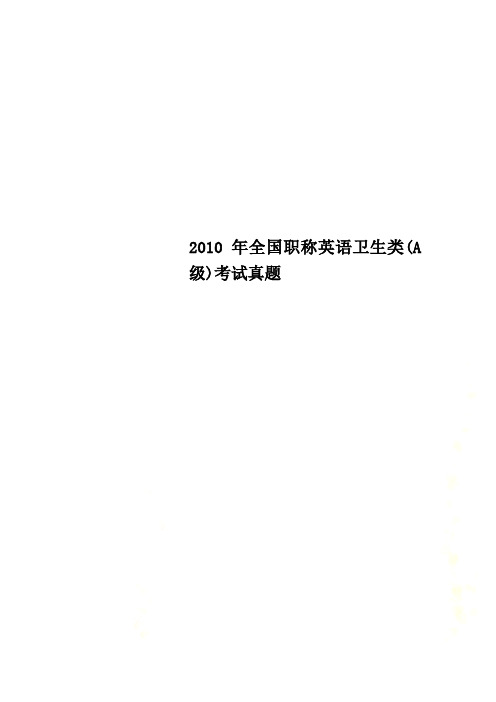
2010年全国职称英语卫生类(A 级)考试真题2010年全国职称英语卫生类(A级)考试真题及答案第1部分:词汇选项(第1-15题,每题1分,共15分)下面每个句子中均有1个词或短语划有底横线,请为每处划线部分确定1个意义最为接近的选项。
1. I want to provide my boys with a decent education.A.private B.special C.general D.good2.Lower taxes would spur investment and help economic growth.A.attract B.encourage C.spend D.require3. Steep stairs can present a particular hazard to older people.A.evidence B.case C.danger D.picture4.The project required ten years of diligent research.A.scientific B.basic C. social D. hardworking5.The two banks have announced plans to merge next year.A. breakB. closeC.sellbine6. He demolished my argument in minutes.A. disprovedB.acceptedC.disputedD.supported7.Her father was a quiet man with graceful manners.A.similar B.polite C.usual D.bad8. Regular visits from a social worker can be of immense value to old people living alone.A. moderateB. equalC. greatD. immediate9. He was rather vague about the reasons why he never finished school.A. unclearB. badC. brightD. general10. He was kept in appalling conditions in prison.A. criticalB. necessaryC. normalD. terrible11. I can't put up with my neighbor's noise any longer, which is driving me mad.A. generateB. measureC. tolerateD.请选择C。
2010年职称英语考试卫生类(C)级试题

[真题] 2010年职称英语考试卫生类(C)级试题词汇选项下面共有15个句子,每个句子中均有1个词或短语带有括号或下划线,请从每个句子后面所给的4个选项中选择1个与括号里边部分意义最相近的词或短语。
第1题:We've been through some (rough) times together.A.longB.shortC.happyD.difficult参考答案:D 您的答案:答案解析:rough意为粗糙的、艰苦的,rough time指困难时刻,与difficult time意思一样。
long意为长的;short意为短的;happy意为幸福的,与rough意义相反。
第2题:She (gave up) her job and started writing poetry.A.lostB.createdC.abandonedD.took参考答案:C 您的答案:答案解析:give up是"放弃"的意思。
如:In view of the circumstances,we should giveup the plan.考虑到情况的变化,我们应该放弃这项计划。
abandon也是"放弃"的意思。
如: After the age of about thirty he abandoned individual ambition.他一过三十就放弃了个人的雄心壮志。
lost的意思是丢失;create意为创造;take意为拿。
第3题:Can you give a (concrete) example to support your idea?A.specialB.goodC.realD.specific参考答案:D 您的答案:答案解析:concrete意为具体的,它的同义词是specific。
如:In painting art,theexpressed most specific theme and image is often the most abstract thinking.在绘画艺术中,最具体的主题和形象所表达的往往是最抽象的思想。
- 1、下载文档前请自行甄别文档内容的完整性,平台不提供额外的编辑、内容补充、找答案等附加服务。
- 2、"仅部分预览"的文档,不可在线预览部分如存在完整性等问题,可反馈申请退款(可完整预览的文档不适用该条件!)。
- 3、如文档侵犯您的权益,请联系客服反馈,我们会尽快为您处理(人工客服工作时间:9:00-18:30)。
2010年职称英语考试卫生类模拟试题2010年职称英语考试卫生类模拟试题第1部分:词汇选项(第1~15题,每题1分,共15分)下面共有15个句子,每个句子中均有1个词或短语划有底横线,请从每个句子后面所给的4个选项中选择1个与划线部分意义最相近的词或短语。
答案一律涂在答题卡相应的位置上。
1. It is useless to argue with him once he has made up his mind.A. settledB. solvedC. saidD. decided2. International applicants are not eligible for financial aid.A. impressedB. mutualC. qualifiedD. outraged3. Two events have highlighted the tensions in recent years.A. distortedB. extendedC. emphasizedD. illustrated4. You must shine your shoes.A. lightenB. cleanC. washD. polish5. Don't refuse to let me know if there is anything I can do for you.A. turn downB. reflectC. rejoyD. wait6. John takes after his mother in character.A. embarrassesB. humiliatesC. identifiesD. resembles7. They didn't realize how serious the problem was.A. knowB. forgetC. doubtD. remember8. How many radios will your factory turn out this year?A. produceB. destroyC. exportD. import9. They had a far better yield than any other farm miles around thisyear.A. goodsB. soilC. climateD. harvest10. Even sensible men do absurd things sometimes.A. carelessB. impulsiveC. regrettableD. foolish11. We consume a lot more than we are able to produce.A. buyB. sellC. useD. waste12. The earthquake has cause serious damage to this city.A. destructionB. hurtC. injuryD. wound13. I think this is a deliberate insult.primary qualifications for employment and, of the two, skills were clearly preferred."We hire talent" are three key words. Employers want workers who are skilled and experienced on the particular equipment or in the specific area of work where their need is.16. Government and educational institutes are required by the law to make every effort to open hiring opportunities to women and minority workers.A. RightB. WrongC. Not mentioned17. Managers in the rapidly growing computer service field preferred men to women.A. RightB. WrongC. Not mentioned18. Women who are already in the field of computer science are being promoted.A. RightB. WrongC. Not mentioned19. Overall, companies reported a 40 percent increase in the number of women hired.A. RightB. WrongC. Not mentioned20. Employers prefer to hire more skilled women.A. RightB. WrongC. Not mentioned21. In jobs traditionally considered female positions, the stereotype is quickly being eroded.A. RightB. WrongC. Not mentioned22. Companies want to hire well-qualified people, who know what they are doing, according to the Devry study.A. RightB. WrongC. Not mentioned第3部分:概括大意与完成句子(第23 ~30题,每题1分,共8分)阅读下面这篇短文,短文后有2项测试任务:(1)第23 ~26题要求从所给的6个选项中为第1、2、4、5段每段选择1个正确的小标题;(2)第27 ~30题要求从所给的6个选项中选择4个正确选项,分别完成每个句子。
请将答案涂在答题卡相应的位置上。
A Brief Introduction of Hurricanes(龙卷风)1. Did you know that before 1950, hurricanes had no names? They were simply given numbers. The first names were simply Alpha, Bravo. Charlie, etc. But in 1953, female names were given because of the unpredictability(不可预知)factor of the storms. In 1979, realizing the sexist(性别歧视的)nature of such names, the lists were expanded to include both men and women.2. Hurricanes and typhoons(台风)are the same things. If they form in the Atlantic, we call these strong storms hurricanes, from the west Indian word hurricane, meaning "big wind". And if they are Pacific storms, they are called typhoons from the Chinese tai fun, meaning "great wind". To be classified as a hurricane, the storm must havemaximum winds of at least 75 mph. These storms are big, many hundreds of miles in diameter.3. Hurricanes get their power from water vapor as it gives out its stored-up energy. All water vapor gives out heat as it condenses(凝结)from a gaseous state to a liquid state over fixed points on the equator(赤道). To make a hurricane, you must have extremely wet, warm air, the kind of air that can only be found in tropical regions.4. Scientists have determined that the heat given out in the process of water condensation can be as high as 95 billion kilowatts per hour. In just one day alone, the storm can produce more energy than many industrialized nations need in an entire year! The problem is that we don't know how to make such great energy work for us.5. Predicting the path of a hurricane is one of the most difficult tasks for forecasters. It moves at a typical speed of 15 mph. But not always. Some storms may race along at twice this speed, then suddenly stop and remain in the same location in the ocean for several days. It can be maddening(发疯的)if you live in a coastal area that may be hit.6. The biggest advance in early detection is continuous watch from weather satellites. With these, we can see the storms form and track them fully, from birth to death. While they can still kill people and destroy property, hurricanes will never surprise any nation again.23. Paragraph 1 ________24. Paragraph 2 ________25. Paragraph 4 ________26. Paragraph 5 ________A. Harnessing the Hurricane EnergyB. Difficulty in Forecasting theCourse of a HurricaneC. Huge Energy Stored in a HurricaneD. Forecasting a Hurricane throughSatellite WatchingE. Different Names for the SameThingsF. A Short History of NamingHurricanes27. Both male and female names are used for hurricanes in consideration of ________.28. Using weather satellites can ensure ________ of hurricanes.29. Energy specialists may be interested in ________ of hurricanes.30. Scientists cannot accurately predict the course of a hurricane due to ________.A. convenienceB. sex equalityC. its connection with humansD. the huge powerE. the timely(及时的)discoveryF. its uncertainty第4部分:阅读理解(第31~45题,每题3分,共45分)下面有3篇短文,每篇短文后有5道题,每题后面有4个选项。
